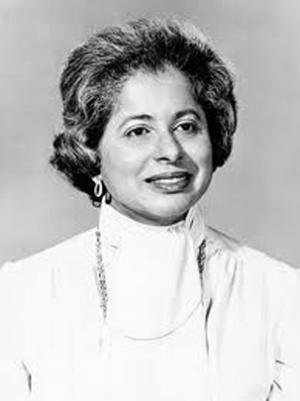 Patricia Roberts Harris Patricia Roberts HarrisAmbassador, Secretary of Housing and
Urban Development, Secretary of Health,
Education, and Welfare
Patricia Roberts was born in
Mattoon, Illinois, on May 31, 1924. Her
father was a railroad Pullman Porter, and her
mother was a schoolteacher. She attended high
school in Chicago, and did so well that she
received five scholarship offers to college. She
chose Howard University in Washington, D.C., and
graduated Summa Cum Laude with a bachelor’s
degree in economics and political science in
1945.
An active member of the civil rights movement
while at Howard, Roberts participated
in civil rights protests in Washington, D.C., in
1943, and in a student sit-in at a whites-only
cafeteria. She also served as Assistant Director
for the American Council of Human Rights.
After graduating from Howard,
Roberts pursued graduate studies at the
University of Chicago, while serving as program
director for the Young Women's Christian
Association in Chicago. In 1949 she
returned to Washington, D.C., where she did
further graduate work at American University and
worked as assistant director of the American
Council on Human Rights (1949–1953). She
also served six years as executive director of
the national headquarters of Delta Sigma Theta
sorority, and from 1956 to 1960 she chaired the
Housing Committee of the Washington Urban League.
She married Howard University law
professor William Harris in 1955.
Encouraged by her husband, Harris graduated
top of her class from the George
Washington University Law School in 1960,
after which she spent about a year in the
criminal division of the U.S. Department of
Justice. She left the Justice Department after
being appointed to the faculty of the Law School
at Howard University, where she subsequently
attained the rank of Associate Professor and
later Associate Dean of Students.
By now active in the Democratic Party, Harris
was asked to serve on a number of federal civil
rights commissions, including as co-chair of the
National Women's Committee for Civil Rights, with
Mildred McAfee Horton (in 1963). From 1962 to
1965 she worked with the National Capital Area
Civil Liberties Union. Although she relinquished
her administrative post at Howard in 1963, she
remained on the Howard faculty.
Harris gave the seconding address for Lyndon Johnson's
presidential nomination at the 1964 Democratic
National Convention in Atlantic City, New Jersey.
In 1965 President Johnson named her Ambassador to
Luxembourg, and she served in that position until
1967; she thus became the first black woman to
ever serve as a U.S. Ambassador.
Harris returned to Howard as a full professor,
and was named Dean of the School of Law in 1969.
She resigned the latter post a month later,
however, when Howard University President James
E. Cheek refused to support her strong stand
against student protests. She then entered
private practice in corporate law, while also
serving on the Legal Defense Fund of the NAACP's
executive board (1967-1977).
In 1977 President
Jimmy Carter nominated Harris as Secretary of
the Department of Housing and Urban Development.
During a contentious Senate confirmation hearing,
she was criticized for her establishment
connections and questioned by Senator William Proxmire as to
whether or not she was adequately attuned to the
problems of poor Americans. Harris’ response
was: “Senator, I am one of them. You do not
seem to understand who I am. I’m a black
woman, the daughter of a dining car waiter.
I’m a black woman who even eight years ago
could not buy a house in some parts of the
District of Columbia. Senator, to say I’m
not by and of and for the people is to show a
lack of understanding of who I am and where I
came from.” Her nomination was confirmed,
and she became the first black woman to hold a
Cabinet position.
President Carter undertook a massive
reorganization of his Cabinet in 1979, during
which Harris was asked to become Secretary of the
Department of Health, Education, and Welfare
(which subsequently became the Department of
Health and Human Services). She served in that
position through the end of Carter's term, after
which she returned to private law practice and
became Professor of Law at the George Washington
National Law Center.
Patricia Roberts Harris died of breast cancer
in Washington, D.C. on March 23, 1985.

Black History Now http://blackhistorynow.com/patricia-roberts-harris/
BlackPast.org http://www.blackpast.org/aah/harris-patricia-roberts-1924-1985
Encyclopędia Britannica https://www.britannica.com/biography/Patricia-Roberts-Harris

Lyndon
Johnson
President
Jimmy Carter
William Proxmire
Questions or comments about
this page?
|



